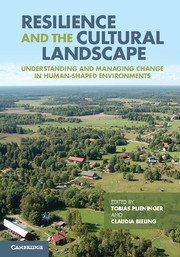 Resilience and the Cultural Landscape
Resilience and the Cultural Landscape Published online by Cambridge University Press: 05 November 2012
Learning about Burgundy
In the mid-1970s, my colleague Bill Marquardt and I, with our students, began an archaeological project to excavate an Iron Age (Celtic) hill fort in Burgundy (France) called Mont Dardon. I had been there before, at least vicariously, in my years as a Latin student; the astonishing view of the landscape from Dardon’s summit is the setting for dramatic passages in Caesar’s Gallic Wars. The site was possibly an early capital of a polity called the Aedui, who were first Caesar’s allies and then his foes. Dardon was inhabited a thousand years before, during, and for fourteen hundred years after the Roman conquest. We realised that the site and its surrounding landscape provide the perfect setting for a tale only archaeology can tell – not in words carefully chosen by an ambitious general but in the ways life changed for those who dwelt in that landscape (Crumley & Marquardt, 1987).
Archaeology, although only one of the ways our project learns about the past, lies at the heart of our work in Burgundy. Most early team members were archaeologists trained within the discipline of anthropology, the broad-in-space and deep-in-time study of human behaviour. We wished to pose anthropological questions: How did Aeduan politics and economy change after the Conquest? What spiritual and social adjustments to Roman rule were made? How did the region fare when the Western Empire crumbled and groups from eastern and northern Europe arrived?
To save this book to your Kindle, first ensure [email protected] is added to your Approved Personal Document E-mail List under your Personal Document Settings on the Manage Your Content and Devices page of your Amazon account. Then enter the ‘name’ part of your Kindle email address below. Find out more about saving to your Kindle.
Note you can select to save to either the @free.kindle.com or @kindle.com variations. ‘@free.kindle.com’ emails are free but can only be saved to your device when it is connected to wi-fi. ‘@kindle.com’ emails can be delivered even when you are not connected to wi-fi, but note that service fees apply.
Find out more about the Kindle Personal Document Service.
To save content items to your account, please confirm that you agree to abide by our usage policies. If this is the first time you use this feature, you will be asked to authorise Cambridge Core to connect with your account. Find out more about saving content to Dropbox.
To save content items to your account, please confirm that you agree to abide by our usage policies. If this is the first time you use this feature, you will be asked to authorise Cambridge Core to connect with your account. Find out more about saving content to Google Drive.